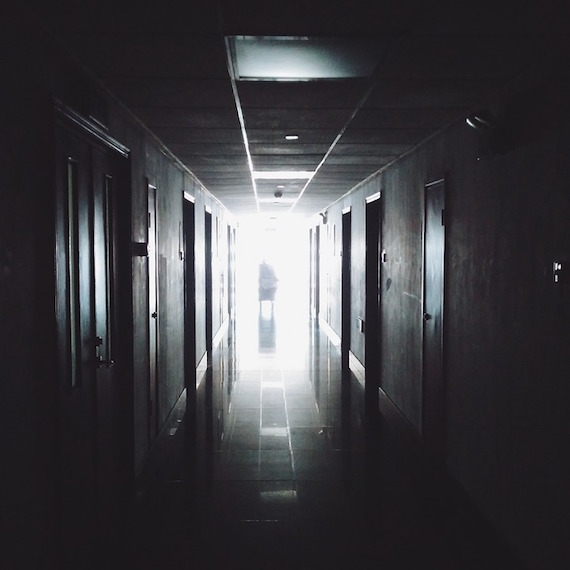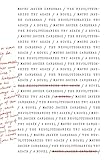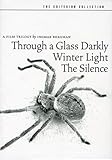
I (like to) believe that in the year 2002, when I started to write my first novel, The Revolutionaries Try Again, I approached English, my second language, as a system that, through minor detonations of syntax, could be restructured to accommodate my preoccupations. Constraining the use of conjunctions to contort sentences? Worked. Blanking parentheticals after writing them (no seas curiosa Jessica) and then trying to write about their potential content to dramatize blanks in memory? Did not. Relying on chance to retrofit associations into a mostly blank memory of my time at the Hospice Luis Plaza Dañin? Perhaps.
 At my Jesuit high school in Guayaquil, Ecuador, I belonged to a volunteer group known as the apostolic group. Every Saturday we visited the old and the infirm at the hospice Luis Plaza Dañin. I don’t remember much about my time there besides a long hallway, benches, baskets with bread. Why the impulse to write about what’s mostly a blank? A cynic (like me) might contend that, since the hospice experience fits into the coming of age narrative (boy visits the old and the infirm, hands them bread and milk, realizes the world contains unspeakable suffering, etc.), I am, in retrospect, assigning great significance to my time at the hospice Luis Plaza Dañin. The contention of the cynic (still me) faces complications. Since back then I’d wanted to become a Jesuit priest, those visits to the hospice Luis Plaza Dañin were obvious manifestations of that impulse to become a Jesuit priest, an impulse that to this day provides a dangerous type of solace, incidentally, because if you persist in seeing yourself as the Jesuit priest boy who cared for the old and the infirm, you are prone to overlook the almost nothing you are doing for others now.
At my Jesuit high school in Guayaquil, Ecuador, I belonged to a volunteer group known as the apostolic group. Every Saturday we visited the old and the infirm at the hospice Luis Plaza Dañin. I don’t remember much about my time there besides a long hallway, benches, baskets with bread. Why the impulse to write about what’s mostly a blank? A cynic (like me) might contend that, since the hospice experience fits into the coming of age narrative (boy visits the old and the infirm, hands them bread and milk, realizes the world contains unspeakable suffering, etc.), I am, in retrospect, assigning great significance to my time at the hospice Luis Plaza Dañin. The contention of the cynic (still me) faces complications. Since back then I’d wanted to become a Jesuit priest, those visits to the hospice Luis Plaza Dañin were obvious manifestations of that impulse to become a Jesuit priest, an impulse that to this day provides a dangerous type of solace, incidentally, because if you persist in seeing yourself as the Jesuit priest boy who cared for the old and the infirm, you are prone to overlook the almost nothing you are doing for others now.
How to write about mostly blanks? Of course I could have retrofitted so-called telling details, scents, quirks of character, sequences out of the Conflict-Action-Resolution machine, but because the rest of my life already contained so much machine crap (dayjobs, ads, diaper dialogues), and because I believed literature’s sole purpose was to not be machine crap, I attempted alternatives.


 How about if I open three books at random, I thought, jot down whatever I find compelling in those pages, and see if what I jot down yields any associations that I can outstretch along the long hallway of the hospice Luis Plaza Dañin? Not everything in chance is chance, John Cage said. One must learn to ask the right question: what are the three books that come to mind when I think of the hospice Luis Plaza Dañin? The answer came quickly: The Book of Psalms, The Book of Disquiet by Fernando Pessoa, The End of Story by Lydia Davis. The first two came to mind because of their religious associations (the cover of my edition of The Book of Disquiet contains a man in agony, though later someone pointed out the man is just a goalie failing to catch a soccer ball). The End of The Story came to mind because to me it’s a performance of how forgetting the contours of the loved one does not diminish the intensity one feels for the loved one.
How about if I open three books at random, I thought, jot down whatever I find compelling in those pages, and see if what I jot down yields any associations that I can outstretch along the long hallway of the hospice Luis Plaza Dañin? Not everything in chance is chance, John Cage said. One must learn to ask the right question: what are the three books that come to mind when I think of the hospice Luis Plaza Dañin? The answer came quickly: The Book of Psalms, The Book of Disquiet by Fernando Pessoa, The End of Story by Lydia Davis. The first two came to mind because of their religious associations (the cover of my edition of The Book of Disquiet contains a man in agony, though later someone pointed out the man is just a goalie failing to catch a soccer ball). The End of The Story came to mind because to me it’s a performance of how forgetting the contours of the loved one does not diminish the intensity one feels for the loved one.
According to my notes, on March 3rd, 2012, I completed the first cycle of opening each of these three books at random. The next day I completed three more. Only the first two cycles yielded immediate reactions. The reactions to the passages below are from 2012, the reactions to my reactions from 2016.
(1) From The Book of Psalms: Do not be mute and do not be quiet, god.
Reaction: What did the elderly think of us? Were they really waiting for us on that long hallway? Or were they always there in the afternoons? Where else would they go? None of them had their own room.
 Reaction to reaction: The muteness of god many of us members of the apostolic group would experience years later, the muteness of the elderly over the years since I couldn’t remember anything they’d said to me, the white noise of the train in The Silence by Ingmar Bergman — all of these might have played a role in wondering what the elderly thought of us. I remembered an immense room we weren’t supposed to enter or didn’t want to enter but did, an empty room with tall ceilings and rows of beds where those who were too sick to walk to the long hallway remained.
Reaction to reaction: The muteness of god many of us members of the apostolic group would experience years later, the muteness of the elderly over the years since I couldn’t remember anything they’d said to me, the white noise of the train in The Silence by Ingmar Bergman — all of these might have played a role in wondering what the elderly thought of us. I remembered an immense room we weren’t supposed to enter or didn’t want to enter but did, an empty room with tall ceilings and rows of beds where those who were too sick to walk to the long hallway remained.
(2) From The Book of Disquiet: Most people are other people.
Reaction: Did I wonder who the elderly were as I am doing now? Who were they when they were young? Did they also spend their lives in pursuit of something they didn’t want?
Reaction to reaction: We were probably too enamored with our role as saviors of the old and the infirm to wonder who they were, although it isn’t farfetched to imagine many of us did ask them who they used to be, or perhaps they told us without us having to ask them, given we did spend hours sitting next to them on the benches along the long hallway.
(3) From End of the Story: When I returned he said very little to me and kept turning away from me, and because he kept turning away from me, I was frightened and couldn’t sleep.
Reaction: Perhaps there’s an elderly man along the long hallway who, because he kept turning away from us, frightened us?
Reaction to reaction: I can see now why I might have found this passage about turning away compelling. It’s easier to invent someone who’s turning away from you because you don’t have to imagine a face. I also associated this turning away with the men in “The Subway” by George Tooker, although in that painting the men are not turning away but staring in hiding. To imagine the old and the infirm turning away from me felt like the correct representation of them. No matter how often I’ve tried to dismiss the almost blank memory of the hospice Luis Plaza Dañin, the feeling that every Saturday we abandoned the old and the infirm has not subsided. This pious retrospective, the cynic (you know who) might add, is useless. Except perhaps to create the illusion you’re a good person. I don’t disagree. Fiction isn’t meant to be useful though. These are just my attempts at remembering my time at the hospice Luis Plaza Dañin.
The rest of the cycles did not yield enough variations in the material. Seek his presence always, The Book of Psalms said, for instance, but I already knew the answer to the reaction I’d jotted down (and yet was god’s presence to be found in that long hallway?). Asleep, I was even more helpless against them, Lydia Davis wrote, and yes, I was helpless against the memory of old and the infirm, whether I was asleep or awake, but how to represent this helplessness without overdramatizing the minute impact of this helplessness?
Perhaps I did not ask the right question. By focusing on books that linked too closely to the hospice Luis Plaza Dañin, I wasn’t likely to unearth new material. For other sections of The Revolutionaries Try Again, I had already tried to focus on books that had no relationship to my content in the hopes that this juxtaposition (the streets of Guayaquil + interviews with John Cage, for instance) would inject new language into content I was too familiar with. But I wasn’t after new material. I was after an atmosphere in which to think about the hospice Luis Plaza Dañín. Since I had already decided not to invent what I couldn’t remember, the exercise of chance might have created an atmosphere in which to obsess about what I could remember, and it was this narrowing of obsession that (I like to believe) yielded the first series of sentences I would later call “performance of an impulse,” a type of sentence that eschews narration (for the most part) but creates dramatic tension by obsessing on the impulse behind the sentence. Here, then, is the performance of the impulse to remember the hospice Luis Plaza Dañín, which appears in chapter XIII of The Revolutionaries Try Again:
The long hallway where the old and the infirm waited for the apostolic group, Leopoldo thinks, the long hallway like a passageway inside cloisters or convents where the old and the infirm waited for the apostolic group every Saturday from 3:00 to 6:00, the long hallway with its hollowed benches alongside its walls where the old and the infirm waited for the apostolic group to hand them sugar bread and milk, where the apostolic group performed cheerfulness and chattiness for the old and the infirm, the long hallway that’s probably empty at night just as it is empty for Leopoldo tonight despite all those Saturdays he’d spent there when he was fifteen or sixteen years old, all those Saturdays he spent in that long hallway at the hospice Luis Plaza Dañín trying to cheer up the old and the infirm who’d been forsaken by their families or who had no families or who had nowhere else to go, who had toiled in menial jobs the entirety of their lives just like the masses of people Leopoldo will encounter inside the bus on his way to Julio’s party tonight — did you even ask the old and the infirm about their jobs, Leopoldo? what could you have possibly said to them to cheer them up? did you actually cheer them up or were you simply a reminder to them that god’s blessings were elsewhere like they’ve always been? — whose last days were spent along a sunless hallway that smelled like the eucalyptus and menthol ointments they rubbed on their chests, which must have reminded them of the Merthiolate their mothers would swab on their scraped elbows and knees, whose last evenings were spent on donated hospital beds inside rooms with unreasonably high ceilings (why did the Jesuits build those rooms with such high ceilings? so that when the time came for the old and the infirm to die the priests could direct them to the vast pointlessness of the lord above?), inside rooms where Leopoldo and Antonio would stroll among the donated hospital beds with their bread baskets just in case they missed someone on the hallway, just in case someone couldn’t get out of bed but still wanted a sugar bun (what did the Jesuits think this exposure to the suffering of the old and the infirm would do to a band of scrawny fifteen year olds? did the Jesuits think that it would change their lives? that they would grow up to be stalwarts against suffering and injustice instead of growing up to be just like everyone else except every now and then they feel guilty about the suffering of the old and the infirm yet at the same time feel superior to everyone else because they were such good Samaritans then?), the long hallway where the faces and names of the old and the infirm continue to slip from him, year after year one more conversation or gesture or emotion vanishing from that long hallway like a punishment, although if you ask him about it Leopoldo will tell you that he’s not fifteen anymore and does not believe in punishments handed down from a god who’s in any case too busy not existing just as Leopoldo’s too busy not existing or barely existing in that long hallway in the hospice Luis Plaza Dañín.
Image Credit: Pixabay.









